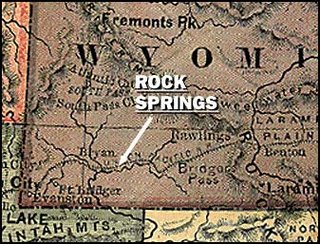By GIL BRADYThe Cowboy TimesFiled 9.24.06
 JACKSON, Wyo. (CT) — First there was the change in venue from the small circuit court here to the more stately Clifford P. Hansen Federal Courthouse as a darkening summer snowstorm churned outside. Then there were the lightening rod theatrics of hired defender Deidre Bainbridge.
JACKSON, Wyo. (CT) — First there was the change in venue from the small circuit court here to the more stately Clifford P. Hansen Federal Courthouse as a darkening summer snowstorm churned outside. Then there were the lightening rod theatrics of hired defender Deidre Bainbridge.
Calling a prosecutor’s diagram of the alleged felony conspiracy to prostitute children by her client a “little scenario,” Bainbridge ignited a series of accusations after the bruising cross-examination of a veteran peace officer by a veteran criminal lawyer, and former New Jersey judge, during a previous hearing.
Playing the race card, during her bail-reduction plea for her client facing life in prison, Bainbridge popped more than one sleepy eye open in this odd and revered court. Remember, only the Idaho case was supposed to matter last Thursday.
By the time deputy county prosecutor Brian Hultman waved at the back of the courtroom and accused a defendant’s son and daughter of threatening a teenage victim/witness, crushing members of the defendant’s family into tears, one thing was certain regarding men facing life behind bars for allegedly sexually enslaving children: Some sort of trial had already begun.
And, apparently for the presiding judge, enough cause was found for one amid all the show.
After listening to hours of direct examination, cross-examination, and redirect examination, 9th Circuit Court Magistrate Frank Hess said he found enough evidence to bound over for trial a 32-year-old Idaho carpenter facing 18 felonies, including the alleged kidnapping and prostitution of a 13-year-old girl smuggled from Mexico.
And by day’s end, he would also rebuke Bainbridge.
Parking his plastic-wrapped cowboy hat at the prosecutor’s table before court began, the very tall and legendary seasonal investigator Bill Miller brought out water pitchers for all sides, but the twenty or so observers slowly filling the benches. Twenty years ago, Miller had been a park gumshoe during one of Jackson’s still whispered about great unsolved mysteries: The ghastly discovery of Eric James Cooper’s animal-ravaged bones around Signal Mountain.
Handing a thermos to Jackson criminal attorney Richard Mulligan, as the ex-judge stood before his dashing female crew of legal eaglets, Miller said: “Normally, I don’t carry water for the defense.”
“But in this case, you’ll make an exception?” Mulligan asked.
“Maybe—,” Miller replied, flashing a stern grin. Before squaring off at the witness stand, two sheriff’s deputies sat Mulligan’s goateed client in the vacant jury box, guarding him until his lawyer wrangled an extra seat. Wrists shackled and lashed to the waist of his blue jump suit, the fit-looking defendant, jailed here since Sept.11, nodded at his only familiar supporter: a plump woman about his age, her long dark hair pulled back, sitting anxiously in the front row.
Across the room, Hultman sat engrossed in a fat green law book with Miller beside him, eyeing the court, admiring all his water pitchers. Both men wore crisp blue blazers. For the record, of the three Mulligan looked bigger—richer somehow—in his finely tailored blue pin-striped suit as he crossed to chat with Hultman, then returned to his crowded defense table of assistants and one busy Spanish interpreter. Sensing perhaps that more than the clock was ticking, Mulligan stood and said: “Well, I might as well use my time profitably,” before convening a last huddle around the jury box with his client and the woman with the pulled-back dark hair.
As Mulligan and his jovial enthusiasm vetted Miller's many police reports, Hultman’s spidery diagram of the state’s theory of exotic names, John Doe johns, photos tying defendants to alleged child sex slaves, corroborating police interviews, and one intriguing old dispatch call, all theoretically locking this lurid plot into place at three Jackson abodes of illicit deeds, seemed farthest from his mind.
Mulligan's early questioning zeroed-in on a Sept.10 phone call that his client allegedly made while in custody in the Madison County, Idaho, sheriff’s office. According to Miller, the Idaho defendant called Teton County, Wyo., dispatch and asked to speak to an investigator. Miller asserted that the defendant “knew [the two victims] were brought to Phoenix ” by a man named ‘El Jackal’ then brought to Jackson by two others. Miller also testified that the Idaho carpenter accused another man in the ring of selling the Mexican girls for sex.
If true, the testimony both associates Mulligan’s client with three other defendants in the ring while possibly raising doubt about the Idaho man's commission of specific crimes. And this seemed to play into Mulligan’s strategy of acknowledging his client's familiarity with other defendants and victims, while raising enough doubt for Hess to drop many of the 18 felonies against him.
Mulligan also went to work on the identity of the second victim/witness—asking Miller about the second girl’s last name and getting Miller to testify that police could not ascertain it. And like that: the ex-judge removed one leg from under a stack of state charges supported by this alleged key witness. A witness that no official can say where she is—or even if she still exists—outside of testimony and photographs reportedly used to lure young men at a popular teen hangout here.
Mulligan then poked and jabbed at investigators' reports in Miller's long hands, until dividing the state’s timeline of the alleged crimes and places they purportedly occurred.
“I saw in a report someplace,” Miller recalled under Mulligan’s laser-guided cross-exam of motels where Hultman said sex acts with minors took place. “No records after that date,” Miller said about an old tip to Teton County dispatch. The only record, so far, that pins down a specific day in the state’s nearly six-week timeline, between March and April 2004, when the alleged crimes are said to have occurred. Miller also testified that hotels where children were prostituted lacked records of defendants' names.
Mulligan had struck again, using physics to destroy metaphysics. If a complete timeline cannot be proven, how can anyone say certain crimes occurred at any place in time?
But there are some things even a savvy ex-judge can’t make quaint. How did someone so young, 13 at the time, cross international borders and get so far north without money, a job, or a visa? How did a 13 year old meet so many previously unknown older men and know where and how some of them lived? And what was she doing with them and them with her? How did this child know so many allegedly worldly and unholy things about them? Was she just psychic?
This question of whether she’s a tragic victim or a fantastic liar, as a defendant’s family recently alleged to reporters, might just be the difference between probable cause and reasonable doubt. But for now, probable cause is all the state needs to prove.
Mulligan also spent Thursday morning attacking the state’s photographic evidence—which, Hultman says, connects alleged victims, suspects and two ringleaders. Starting from the bottom of Hultman’s elaborate web of sin, Mulligan questioned exotic-sounding “coyote” nicknames like “El Chilango” and “El Colombiano.”Names that sound like old hex signs rather than names given at birth.
“Coyotes” is slang for Mexican smugglers, usually men, who illegally traffic aliens, often women, into the United States in exchange for money or sex, or both. Before leaving Phoenix, the teenage victim reportedly told police that 'El Chilango' held a gun to her head and raped her.
And now it’s a few ticks before one p.m. and Mulligan’s client makes a confused expression as deputies arrive to escort him back to jail.
Before getting into it, Bainbridge announces she might disqualify herself as counsel, because of having previously represented at least one witness in these cases. But that does not stop her from going for the juggler. Like it or not, this could be her one shot to get her client a last taste of the sweet outside. And she has taken an oath to do all she can to achieve that.
Recalling Miller’s prior testimony to Hultman, Bainbridge reminds the court that while in the company of her client the 13-year-old victim had called him “grandpa” and was known to have hugged him in public.
Arguing this testimony suggests a healthy relationship between her client and the alleged victim, Bainbridge pleas for Hess to reduce bail. She adds that her client also reportedly drove the victim back to Phoenix, at some point, and released her “substantially unharmed and in a safe place,” thus, challenging one of the state’s most serious charges of kidnapping.
Soon Bainbridge starts moving around and goes into her windup.
Pacing while citing a recent $50,000 bail county prosecuting attorney Steve Weichman argued for a man alleged to have used a car to try and kill himself and his wife, Bainbridge, her voice peaking, according to court observers, said, “That [man] was a white man. My client is a brown man!”
The 26-year trial lawyer, as advertised in a local phone book, also argued that her Mexican client’s 18 years in the United States and large, extended family here made him an unlikely flight risk.
“It’s not like he’s going to [pack up] his entire family in a car” and drive them all back to Mexico, Bainbridge reportedly said.
Around this point, the placid-looking Hess appeared ready to bound counsel. Perhaps had the day’s proceedings not been moved to accommodate a DUI trial, well, who knows?
Glaring down from high on up, the bespeckled man in black informed the court that his family included two loving Anglo-Hispanic relatives. Hess then scoffed at the insinuation that a “brown man,” accused of 19 amended felonies here, could not get a fair shake in his court or this county.
Soon, Hultman jumps to his feet—perhaps, sensing a golden opportunity.
“I don’t know what amount of bail would ensure that [a man] facing a life sentence, who is not a U.S. citizen, would appear in court?” Hultman said he argued while requesting a $500,000 bond for the restaurateur who, if bound for trial and convicted, could be taking all his meals in Rawlins. Hultman also said bail had nothing to do with race, only with the state’s right to prosecute those alleged to have committed serious crimes.
Rejecting both requests, Hess stayed bail for Bainbridge’s client at $100,000. A client who police allege is the “Jackson-Phoenix” connection for an international human-trafficking ring of “coyotes.”
Court documents filed Wednesday by a Jackson attorney show another defendant facing felony charges related to the alleged prostitution ring entered a plea of “not guilty” and requested an “announcement call.”
Teton County jail warden Capt. Gaylen Merrell said late Friday that three, not two as previously reported, defendants in the cases were still in isolated custody. One, facing lesser felony charges, was released on an unsecured $100,000 note.
Also this week, authorities said a fifth man, Armando Salas, described as a 27-year old Hispanic construction worker, possibly driving a 1996 green Suburban or Chevy Tahoe or a blue 2000 Dodge Durango, possibly with his family, is wanted in connection with these alleged crimes.
On Friday, Hultman said that trying to influence or threaten witnesses in Wyoming is a potential felony offense.
Court documents show that Bainbridge filed a motion to be removed as counsel to a man charged with 19 felonies, including kidnapping, promoting prostitution and sexual assault. As of Friday Hess had not signed the motion.
Calls to Ms. Bainbridge for comment over the weekend were unsuccessful as of late Saturday. Regular 9th Circuit Court Judge Timothy C. Day has issued a gag order banning the pretrial disclosure of defendants’ or victims’ names in the cases.
An alleged ringleader in one case is next scheduled to appear in court at 8:45 a.m. on Oct. 19.By skyless nighfall, by Kelly, around Wilson, and well-dusting the ancient hooked-nose of old Sleeping Indian, snow began falling. By dawn it would runoff as if leaving the scene of a crime.
Stay with The Cowboy Times
 Is America experiencing a new crime wave?
Is America experiencing a new crime wave?


































